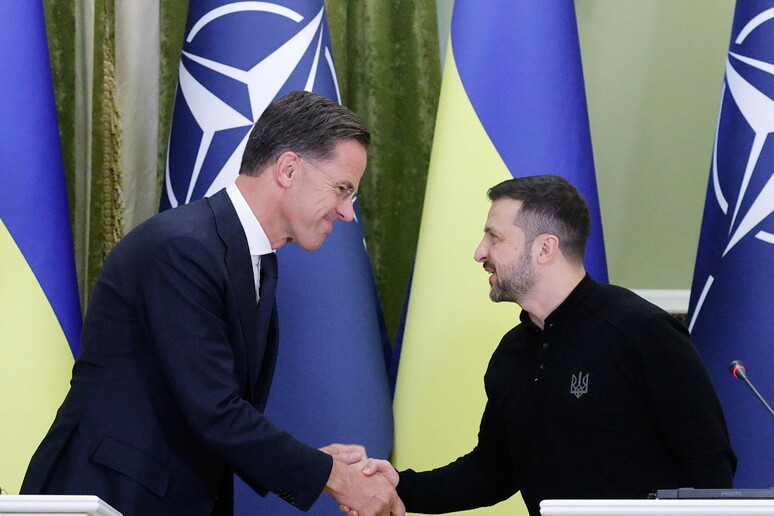Former Dutch Prime Minister Mark Rutte
has become the new Secretary General of NATO. With Russia's war
against Ukraine raging on and Donald Trump's possible return to
the US White House, Rutte faces a tough balancing act between
the military alliance's 32 members and other international
partners such as the European Union.
On Tuesday (October 1), former Dutch Prime Minister Mark Rutte
assumed leadership of the North Atlantic Treaty Organization
(NATO) - the world's most powerful military alliance - as its
new Secretary General.
In opting for the veteran Dutch statesman, a staunch ally of the
United States and stalwart backer of Ukraine, NATO's 32 nations
have picked a leader expected to keep pushing support for Kyiv
and efforts to bolster the alliance's own defences in the face
of Russia.
In an unannounced visit to Kyiv on Thursday (October 3), Rutte
reiterated the alliance's continued support to Ukraine and vowed
"to make crystal clear" to all observers that NATO stands with
the country.
As NATO's leader, Rutte must above all ensure that unity is
maintained within the military alliance. In doing so, he will be
able to put his skills as a strategic bridge-builder to good
use.
The reality of the NATO job means Rutte will be heading a
risk-averse civilian bureaucracy, with hard power ultimately
residing with member countries and above all the United States.
Former NATO chief Jens Stoltenberg has called Mark Rutte "a
great successor". During his more than ten years at the helm,
the Norwegian was often praised for his calm stewardship of the
sometimes fractious alliance.
Push for Ukraine's NATO membership
Since Russia's tanks rolled into Ukraine on February 24, 2022,
the push for more defence has become a major preoccupation in
Europe. Discussions on Ukraine's membership to the military
alliance have since gained momentum.
On Tuesday, Rutte said "Ukraine belongs in NATO" and stressed
that "an independent and democratic Ukraine is vital for peace
and stability in Europe". In Kyiv on Thursday, he added that
"Ukraine is closer to NATO than ever before and will continue on
this path".
His 14-year tenure as prime minister of the Netherlands was
marked by the shooting down of Malaysia Airlines flight MH17
over Ukraine in 2014, with 196 Dutch among the 298 killed.
According to Rutte, NATO allies cannot escape investing more in
NATO. "To truly match our capabilities with our needs, we need
significantly more defence spending." He also said the cost of
supporting Ukraine is "far, far lower than the cost we would
face if we allow [Russian President] Putin to get his way".
During former NATO chief Stoltenberg's ten-year tenure, NATO
welcomed four new allies: Montenegro, North Macedonia, Finland
and Sweden. Both Nordic countries abandoned years of neutrality
after the all-out Russian invasion of Ukraine.
Balancing act with the EU
One of Rutte's priorities is to "deepen our partnerships with
like-minded nations near and far that share our values". He
cited cooperation with countries in East Asia and Oceania and
with the European Union as examples.
According to Rutte, there is potential to boost NATO-EU
cooperation in many areas from supporting Ukraine to countering
hybrid threats. "The European Union is NATO's unique and
essential partner," he said at his first press conference as
Secretary General on Tuesday.
Due to military threats, cyber attacks and economic challenges,
the EU has for the first time appointed a European Commissioner
for Defence. Former Lithuanian Prime Minister Andrius Kubilius
has been designated for the post.
"I welcome…the EU's efforts to defence. I think there is a clear
recognition, both on the side of NATO and of the European Union
that we both value a more capable European defence, of course
being complementary to and interoperable with NATO," Rutte said.
Rutte participated at meetings of the EU heads of state and
government in the European Council for the last 14 years in his
role as Dutch prime minister. He believes the EU and NATO have
the potential to get on the same page, but said that he does not
want to create a parallel structure or duplication of what NATO
is already doing.
In June, Bulgarian President Rumen Radev underlined that
ensuring a high level of security can only be achieved by NATO
and EU countries joining forces. "The outbreak of new military
conflicts in various parts of the world and Russia's full-scale
war of attrition against Ukraine are presenting the defence
industry and science with new and unfamiliar challenges," he
said.
One hurdle for NATO-EU relations is the fact that NATO ally
Türkiye does not recognise the Republic of Cyprus, an EU member
state.
In 1974, Türkiye invaded the northern part of Cyprus following a
Greek-backed military coup. The island has been divided since
then. Türkiye is the only country that recognises the Turkish
Republic of Northern Cyprus as a de facto state - all other
states consider the territory to be part of the Republic of
Cyprus.
Türkiye does not accept the presence of Cyprus in any contacts
between NATO and the EU, based on the so-called "Berlin Plus
agreement" of 1999 that foresees the existence of security
protection rules in the exchange of and access to classified
NATO information.
ALL RIGHTS RESERVED © Copyright ANSA











